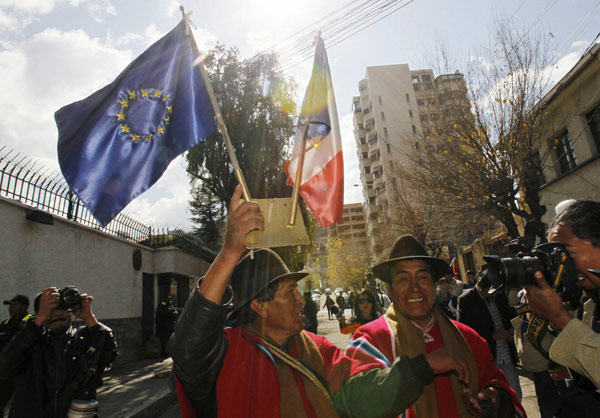Snowden still in Moscow despite Bolivian plane drama
Updated: 2013-07-04 07:14
(Agencies)
|
||||||||
VIENNA/GENEVA, - Bolivia accused the United States on Wednesday of trying to "kidnap" its president, Evo Morales, after his plane was denied permission to fly over some European countries on suspicion he was taking fugitive former US spy agency contractor Edward Snowden to Latin America.
Bolivia said the incident, in which the plane was denied permission to fly over France and Portugal before making a stop in Vienna, was an act of aggression and a violation of international law.
Snowden was not on the plane when it landed in Vienna, an Austrian official said. He is believed to be stranded in the transit lounge of a Moscow airport and the United States has been trying to get its hands on him since he revealed details of its secret surveillance programmes last month.
The White House declined to comment on the Bolivian assertion.
The furore was the latest twist in a saga that has raised debate over the balance between privacy rights and national security. Revelations of US surveillance on European countries have also strained transatlantic relations.
France said on Wednesday that free-trade talks between the European Union and the United States should be delayed by two weeks given tensions over media reports, stemming from the Snowden case, that Washington is spying on the 28-nation bloc.
'NO ONE ELSE ON BOARD'
The Bolivian plane was taking Morales home from an energy conference in Moscow when it landed at Vienna airport on Tuesday evening. Austrian Deputy Chancellor Michael Spindelegger said Morales personally denied that Snowden was aboard his jet and agreed to a voluntary inspection.
"Based on this invitation from Bolivia, a colleague boarded the plane, looked at everything and there was no one else on board," Spindelegger told reporters.
But Bolivian Defence Minister Ruben Saavedra said Morales' plane was not searched because Morales had refused Austrian authorities entry.
Bolivia's ambassador to the United Nations, Sacha Llorenti Soliz, expressed outrage at the chain of events.
"We're talking about the president on an official trip after an official summit being kidnapped," he said in Geneva.
"We have no doubt that it was an order from the White House. By no means should a diplomatic plane with the president be diverted from its route and forced to land in another country."
The ambassador said Bolivia's anger was directed at the United States and the countries that prevented the plane from flying over them.
The Obama administration has advised foreign governments that allowing Snowden to land on their territory could seriously damage their relations with the United States, US and European national security sources said.
The sources said the administration believed such lobbying played a role in persuading countries to which Snowden had applied for asylum to reject or not respond to his bid. The United States believes its diplomacy also has caused countries whose leaders publicly expressed sympathy for Snowden to have second thoughts about the matter in private, they said.
The plane eventually left Vienna and landed in Spain's Canary Islands for refuelling before heading back to Bolivia. But the incident was not likely to be forgotten quickly.
Llorenti said Bolivia, which is part of a Venezuelan-led leftist alliance that has challenged US political and economic influence in Latin America, would complain to the United Nations.
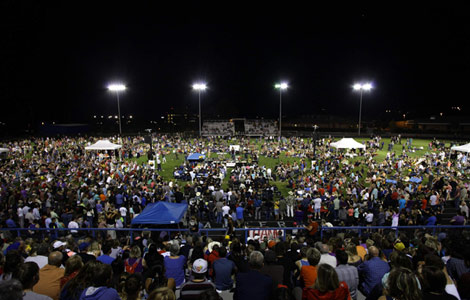
 July 4 in Prescott: Balance of grief, patriotism
July 4 in Prescott: Balance of grief, patriotism
 Jubilant crowds celebrate after Mursi overthrown
Jubilant crowds celebrate after Mursi overthrown
 Growth slowing for services
Growth slowing for services
 Venezuela eyed as Snowden seeks asylum
Venezuela eyed as Snowden seeks asylum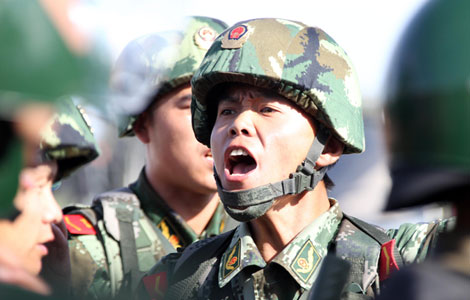
 Anti-terror drill staged in Xinjiang
Anti-terror drill staged in Xinjiang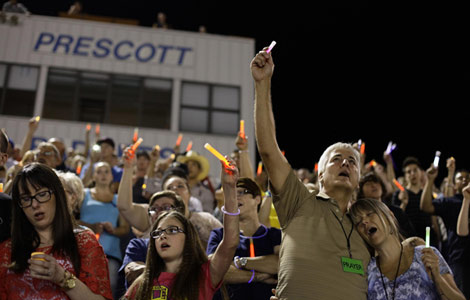
 Memorial service held for 19 Arizona firefighters
Memorial service held for 19 Arizona firefighters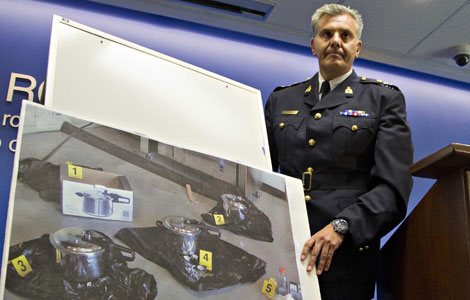
 Canada vigilant after terror plot
Canada vigilant after terror plot
 Beckhams' star power shines
Beckhams' star power shines
Most Viewed
Editor's Picks

|

|

|

|

|

|
Today's Top News
Obama, Merkel agree talks on surveillance program
Filipino executed for drug trafficking
Obama orders US to review aid to Egypt
Snowden still in Moscow
China urges more efficient uses of fiscal funds
Egypt army topples president Mursi
China to strengthen ties with Uganda
Frankfurt aims to be key yuan center
US Weekly

|

|
